Holy Convocation Meaning in the Bible: Spiritual Insight
In the Bible, a Holy Convocation is a sacred assembly ordained by God for communal worship, often tied to holy days and festivals. It emphasizes collective religious participation, reinforcing spiritual unity and adherence to divine laws.
Notable instances include the Sabbath and various Jewish festivals such as Passover and Sukkot. These convocations serve to rejuvenate spiritually, instill communal bonds, and recall significant historical events of divine intervention.
They hold both traditional and modern-day significance, perpetuating religious culture and community solidarity. Understanding their essence can offer deeper insights into their lasting impact on spiritual life and community cohesion.
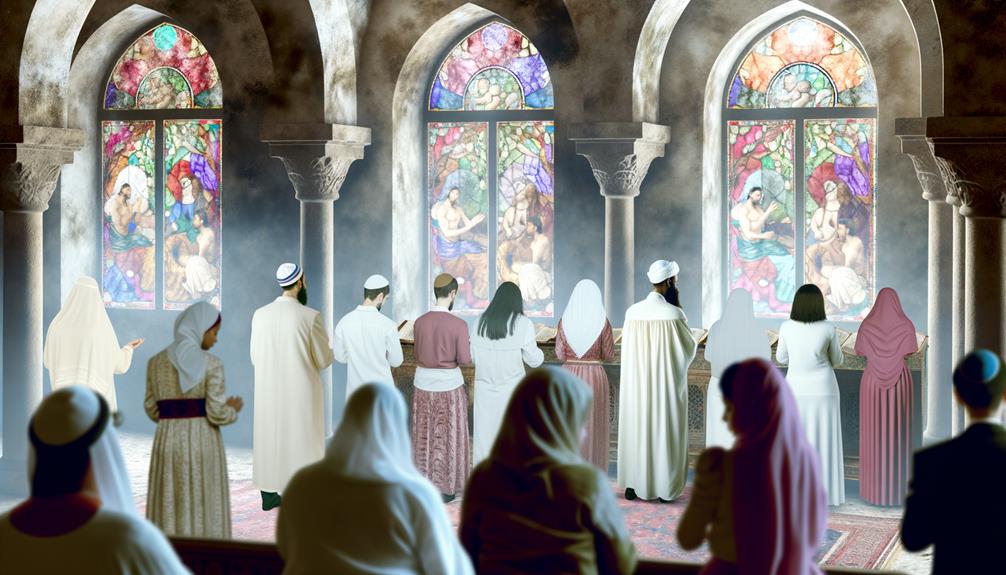
Holy Convocation Meaning in the Bible: A Guide to Sacred Assemblies
| Aspect | Details |
|---|---|
| Definition | A sacred assembly or gathering of believers called for worship and rest. |
| Biblical References | Leviticus 23:3, Exodus 12:16, Numbers 28:18 |
| Purpose | To dedicate time for worship, reflection, and honoring God’s commandments. |
| Connection to Festivals | Often associated with Sabbath days, Passover, and other holy celebrations. |
| Modern Relevance | Observed as spiritual gatherings in churches or religious communities. |
Definition of Holy Convocation
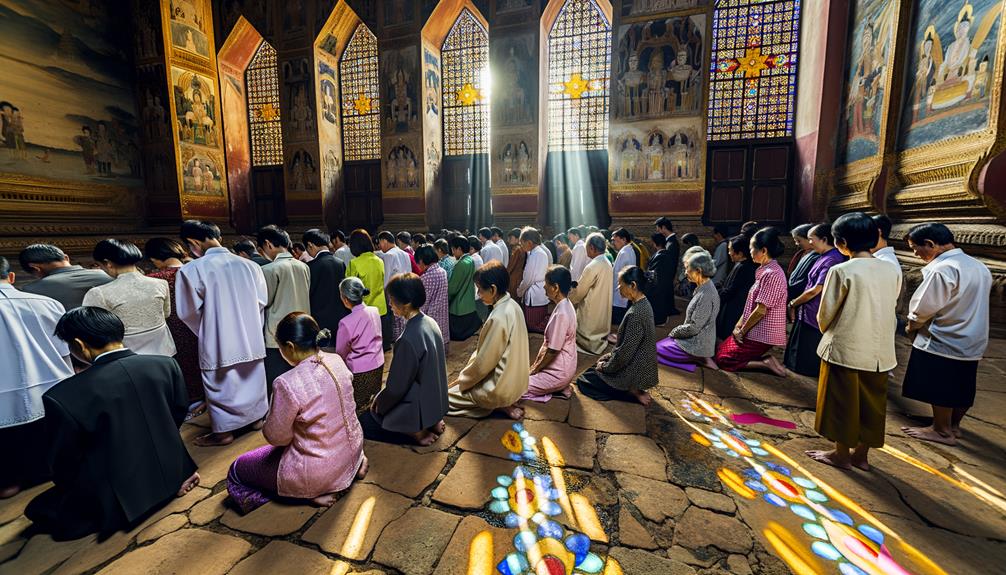
A holy convocation, as defined in biblical texts, refers to a sacred assembly or gathering mandated by God for worship and observance of religious rites.
This concept emphasizes the collective participation of a faith community in ceremonies that honor divine commandments. These convocations are not merely social events but are imbued with spiritual significance, often occurring on designated holy days or festivals.
The term underscores the importance of communal worship, reflecting a structured approach to religious observance. By mandating such assemblies, the biblical tradition aims to reinforce spiritual cohesiveness and adherence to divine law.
This framework serves to cultivate a sense of unity and shared purpose among believers, thereby strengthening the communal fabric of religious life.
Biblical References
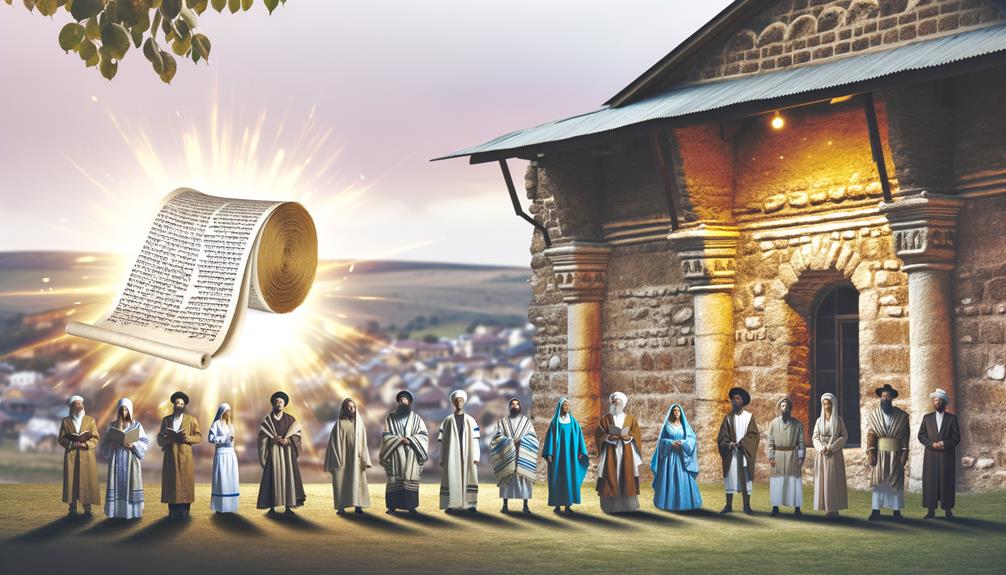
The concept of Holy Convocation is richly illustrated through various examples in both the Old and New Scriptures.
In the Old Scripture, instances such as the observance of the Sabbath and the Feast of Tabernacles highlight its significance within the framework of Jewish religious practices.
Conversely, New Scripture insights provide a broader understanding of Holy Convocation, emphasizing its role in the early Christian community and its theological implications.
Old Testament Examples
Numerous instances in the Old Scripture illustrate the concept of holy convocation, each underscoring its significance in the religious and communal life of the Israelites. The concept of holy convocation is deeply rooted in the religious practices of the Israelites, as demonstrated by the various feasts and festivals prescribed in the Old Scripture. These occasions were more than mere gatherings; they were opportunities for the community to come together in worship, reflection, and celebration. In this way, they served as a reminder of the biblical significance of holy communion, both in terms of spiritual connection to God and the unity of the people.
Leviticus 23 provides an extensive list of such convocations, specifying Sabbath, Passover, and the Feast of Weeks, among others. These convocations were times for collective worship, rest, and reflection, mandated by divine command.
Numbers 29:12-40 details the Feast of Tabernacles as a seven-day holy convocation, emphasizing its importance in fostering a communal connection with God.
Similarly, the Day of Atonement in Leviticus 16 was a solemn convocation dedicated to repentance and atonement for sins.
Each event required meticulous observance, reflecting the profound reverence for divine ordinances in Israelite society.
New Testament Insights
In the New Scriptures, the concept of holy convocation is reinterpreted through the lens of the early Christian community‘s practices and teachings, reflecting a shift from traditional Jewish customs to the emerging Christian liturgical framework.
Acts 2:42 describes the early believers’ devotion to the apostles’ teaching, fellowship, breaking of bread, and prayers, embodying a new form of communal gathering.
Hebrews 10:25 underscores the importance of assembling together, urging believers not to neglect meeting, which mirrors the essence of holy convocation.
The concept extends to the Eucharistic celebrations, as seen in 1 Corinthians 11:20-26, where communal worship and remembrance of Christ’s sacrifice are central.
These passages collectively redefine holy convocation within the context of Christian worship and community.
Significance in Jewish Festivals
Holy convocations play a pivotal role in Jewish festivals, serving as designated times for communal worship and reflection, as prescribed in the Torah.
These gatherings are deeply rooted in historical contexts, encompassing a range of rituals and traditions that have evolved over centuries.
Historical Context of Festivals
Rooted in ancient traditions, Jewish festivals such as Passover, Shavuot, and Sukkot hold profound historical significance that reflects the covenantal relationship between the Israelites and God.
These festivals commemorate pivotal events in Jewish history, each encapsulating a narrative of divine intervention and communal identity.
Passover, for instance, memorializes the Exodus from Egypt, symbolizing liberation and God’s deliverance.
Shavuot marks the giving of the Torah at Mount Sinai, reinforcing the legal and ethical foundations of Jewish life.
Sukkot, celebrating the Israelites’ wilderness journey, emphasizes God’s providence and protection.
Each festival, through its historical context, fosters a collective remembrance and continuity of Jewish faith and heritage, underlining the enduring bond between the divine and the community.
Rituals and Traditions
The historical significance of Jewish festivals is intimately intertwined with the rich tapestry of rituals and traditions that define their observance. These rituals, deeply rooted in biblical mandates, serve not only to commemorate historical events but also to instill spiritual values and communal identity.
For instance, Passover’s Seder meal meticulously recounts the Exodus narrative, reinforcing themes of freedom and divine providence. Similarly, the lighting of the menorah during Hanukkah symbolizes perseverance and faith.
The high holy days, including Rosh Hashanah and Yom Kippur, involve intricate liturgies and acts of atonement, underscoring moral introspection. Collectively, these rituals function as dynamic conduits for historical remembrance, ethical instruction, and the perpetuation of Jewish cultural and religious continuity.
Role in Sabbath Observance

In the context of Sabbath observance, holy convocations serve as designated assemblies for communal worship and spiritual reflection. These gatherings are integral to the Sabbath, emphasizing rest from labor and dedication to collective spiritual enrichment.
Biblically mandated, such convocations foster a sense of unity among believers, allowing them to engage in prayer, scripture reading, and mutual edification. By setting aside time for these sacred assemblies, participants not only honor divine commandments but also reinforce communal bonds.
The structured nature of these convocations guarantees that the sanctity of the Sabbath is preserved, creating a rhythm of rest and reverence distinct from the routine of daily life, thereby underscoring the Sabbath’s role as a cornerstone of spiritual discipline.
Historical Context

Understanding the role of holy convocations in the historical context of ancient Israel provides deeper insights into their significance and evolution within biblical tradition. These sacred assemblies were central to Israelite religious life, shaping communal identity and reinforcing covenantal bonds with God. The convocations aligned with key agricultural and religious festivals, marking pivotal moments in the Israelite year.
| Event | Significance |
|---|---|
| Passover | Liberation from Egypt |
| Feast of Weeks | Firstfruits and Torah giving |
| Feast of Tabernacles | Wilderness journey commemoration |
| Day of Atonement | National repentance |
| Sabbatical Year | Land rest and debt release |
These gatherings fostered unity and reflected the cyclical nature of life and faith in ancient Israel.
Spiritual Implications
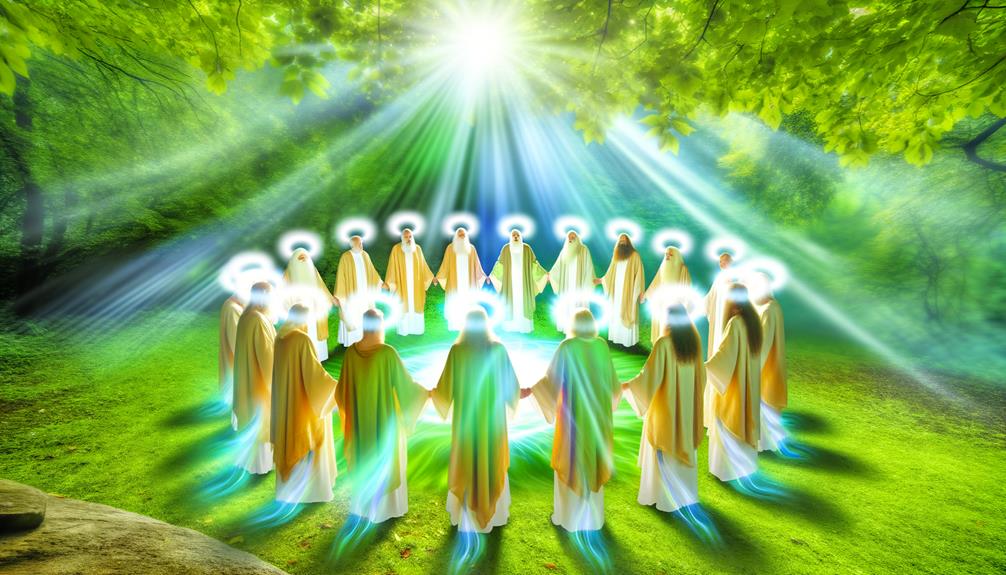
Holy convocations, as delineated in biblical texts, carry profound spiritual implications that extend beyond their historical context, fostering a deeper connection between the divine and the community.
These sacred assemblies serve as crucial moments for collective worship, reflection, and renewal of faith. They create a communal environment where individuals can experience a heightened sense of divine presence and unity.
Additionally, holy convocations underscore the importance of regular, intentional gatherings in maintaining spiritual energy. The prescribed rituals and observances act as tangible reminders of God’s covenant with His people and reinforce communal identity.
Modern-Day Relevance
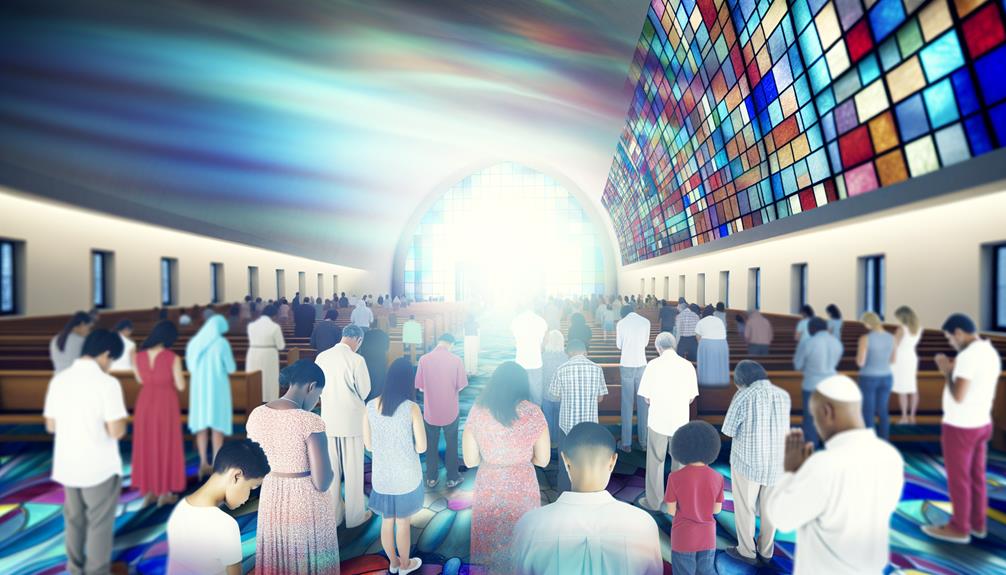
The concept of holy convocations continues to hold significant relevance in contemporary religious practices, offering a structured framework for communal worship and spiritual rejuvenation. In modern times, these convocations facilitate collective religious experiences, reinforcing communal bonds and shared faith. They serve as designated times for reflection, prayer, and reinforcement of doctrinal teachings, thereby fostering spiritual growth.
| Aspect | Traditional Convocations | Modern Adaptations |
|---|---|---|
| Purpose | Worship and adherence to rituals | Community building, teaching |
| Frequency | Set by religious calendar | Flexible, often annual |
| Participation | Mandatory for community members | Encouraged, often voluntary |
Examples in Scripture
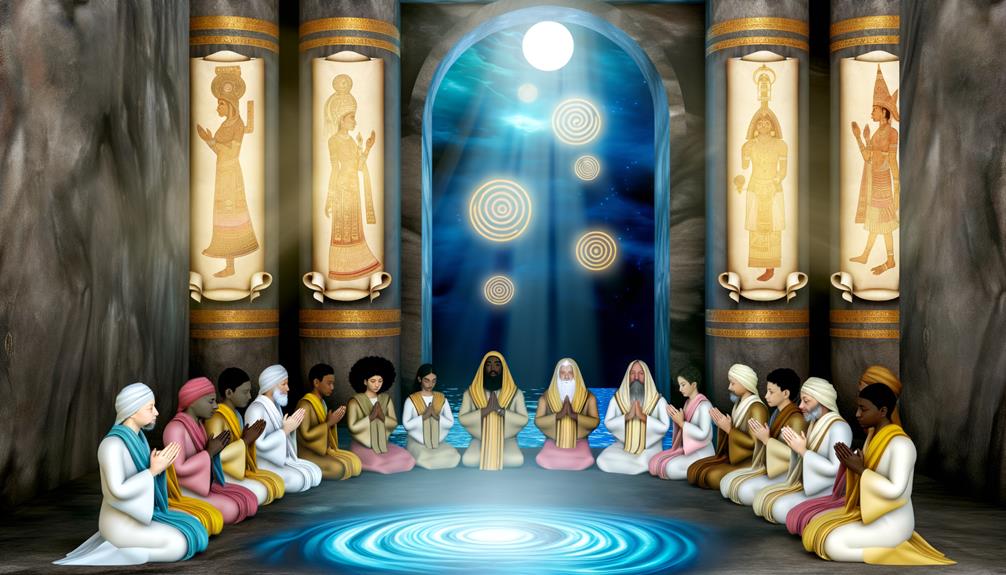
Frequently, scripture provides detailed accounts of holy convocations, illustrating their significance and the specific practices associated with them.
For instance, Leviticus 23 outlines several holy convocations, including the Sabbath, Passover, and the Feast of Weeks. These convocations mandated rest and assembly, emphasizing collective worship and adherence to divine commandments.
Similarly, Numbers 28-29 describes offerings and sacrifices associated with these sacred gatherings.
Another notable example is the Day of Atonement (Yom Kippur) as depicted in Leviticus 16, where the congregation would gather for atonement and purification rituals.
These examples underscore the importance of communal observance, ritual purity, and obedience to God’s statutes, reflecting a profound spiritual and societal structure rooted in the Hebrew tradition.
Conclusion
In principle, the concept of a holy convocation, as elucidated in biblical texts, serves as a cornerstone for understanding communal worship and sacred gatherings.
Rooted in Jewish festivals and Sabbath observance, it underscores the profound historical and spiritual dimensions of collective religious experience.
Such convocations, echoing the solemn assemblies of ancient Israel, continue to resonate today, symbolizing unity and reverence within faith communities.
These gatherings, imbued with ritualistic significance, persist as essential expressions of communal piety and devotion.






